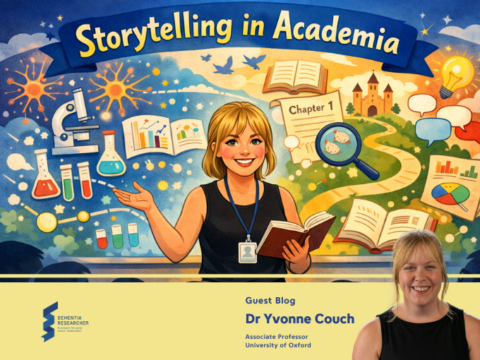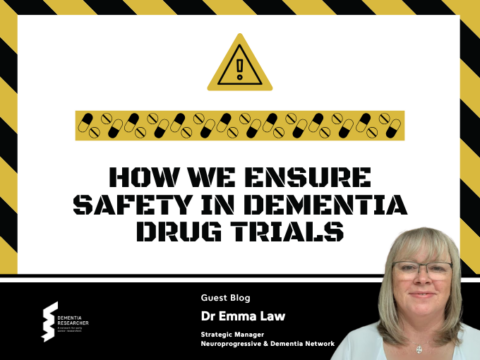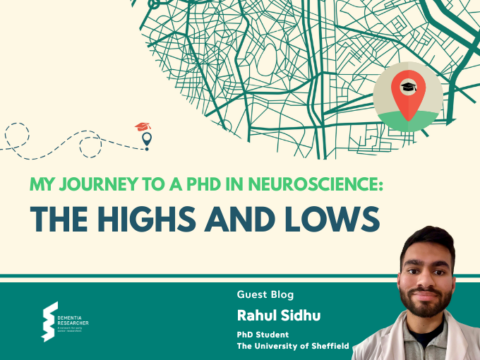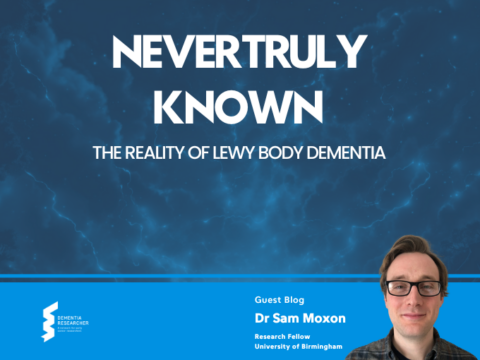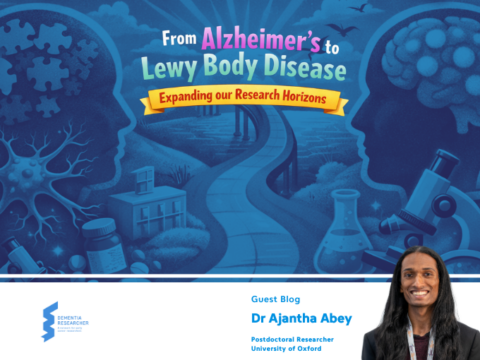Hello everyone, it is really great to be here writing to you! As a new blogger for Dementia Researcher, I would like to introduce myself, my research, and talk a little about what I plan on blogging in the coming months. I hope my blogs will be interesting and useful to you, and I am really open to suggestions on anything you would like to hear about!
First things first… my name is Felicity, but most people call me Flick! I am originally from Huddersfield, West Yorkshire, raised in Sheffield, South Yorkshire and very proud of it! I’m in the first year of studying for my PhD, having started out in October 2020. I am at Loughborough University, which many of you may not associate with dementia research, but there is actually quite a lot going on there – see the Dementia Researcher podcast ‘Building Computers from Human Brain Cells’ and the recently formed ACTInG (Applied Cognition, Technology & Interaction Group). This is a group I am part of, and we are an interdisciplinary group interested in dementia, cognitive decline, and associated disabilities research – check out our website here!
Now, back to me!! My journey to dementia research began in my undergraduate study (also at Loughborough) when we looked at dementia during a cognitive psychology module – I found it such an interesting area where there seemed to be a surge in research interest. A year or so later when I was doing my undergraduate dissertation, I decided I would like to explore the experiences of informal carers of people living with dementia, the support they and their loved one have received from formal support services. This coincided with my own gran being diagnosed with mixed dementia (Alzheimer’s disease and vascular dementia). Resultingly, my interest in research in this area increased.
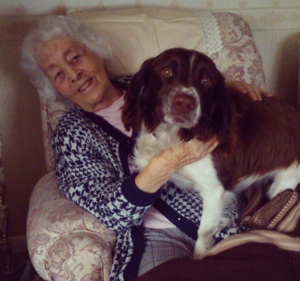
My gran: Jean Violet May Tyler with Bessy the dog.
Following from my undergraduate degree in Social Psychology, I applied for funding for a masters + PhD, I was unfortunately unsuccessful in this. I decided to still do the master’s degree, also at Loughborough (can you see a theme emerging here?!) in Social Science Research (Communication and Media) as I could get funding through student finance for this. This master’s equipped me with knowledge of philosophy and research design in various approaches and methods and is intended to help provide a basis for which to go on to studying for a PhD.
Again, for my master’s dissertation project, my interest in dementia held on. For this dissertation, I looked at advice in online forums for informal carers of people living with dementia. When I started the masters, my gran was now living in a care home, unable to recall my name, but her face still lit up every time we saw one another. She would hold my hand as we talked, I still felt such strong love from her, she was truly such a gentle and kind person. My gran sadly passed away in November of 2019. I have her photo on the wall where I work to remind me when I am struggling of why I am doing this. It really helps to think of her, and if my research can in anyway improve communication between people living with dementia and others, I will be so happy.
After graduating from the MSc, I headed out to try and find a research assistant role, hopefully in a dementia-related area. I just did not seem to have enough experience for a lot of the jobs I was interested in – with most saying ‘PhD desirable’. I ended up working back at Tesco, which was fine, but was not the job I wanted to be in. Shortly before the Covid-19 pandemic hit in February 2020, I received a message from a couple of different friends saying a PhD studentship is being advertised at Loughborough that sounds perfect for you. It did sound perfect, I applied and interviewed and was over the moon when I got the studentship.
My PhD research is titled ‘Managing identity in dementia: Interrogating the operationalisation of identity work and its relationship with media representations’. One part of the research will involve using conversation analysis to look at how identity is produced in interactions between people living with dementia and others, focusing on how identity is jointly produced. Conversation analysis is an approach I have really come to admire in the short space of time I have been learning about it. Conversation analysis is an approach for describing, analysing and understanding talk and is interested in the social actions that talk achieves such as displaying sympathy or complaining, for example. Talk achieves actions through the way a speaker designs their talk – their choice of words, their tone, and emphasis etc. But I will save the details of conversation analysis for another post, if you are curious for more information, check out this YouTube video from Prof. Liz Stokoe.
Another part of my research will look at media representations of dementia – involving an analysis of newspaper discourses, this builds on my supervisor Prof. Liz Peel’s work. I will then conduct focus groups in which I want to involve people living with dementia in discussing vignettes from real media articles. If you have any experience in research with people living with dementia, or you are living with dementia yourself, I would really love to hear from you and your experiences.
I did not intend for this post to be quite such a personal one, but I think our motivations for why we want to do dementia research are often quite personal, and we probably all know or have known someone living with dementia.
I would like to end on a different note by discussing what you can expect to see in future blogs. I would like to discuss a broad range of things through these blogs – research methods, ethics approval (I will be doing this in the next month), events, careers – I hope to do this in a way that does not just tell you what I did, but also provides some tips, or pitfalls to avoid.
Ta ra for now!
Author

Felicity Slocombe
Felicity Slocombe is a first year PhD Student from Loughborough University. Felicity’s research focuses on identity and dementia and how identity can be managed interactionally – how we can help support identity of people living with dementia through our conversations. Driven by a family connection to dementia, and writing each month on a range of topics from her work, and that of her wider group ACTInG (Applied Cognition Technology and Interaction Group), and sharing news from her training and events.

 Print This Post
Print This Post
